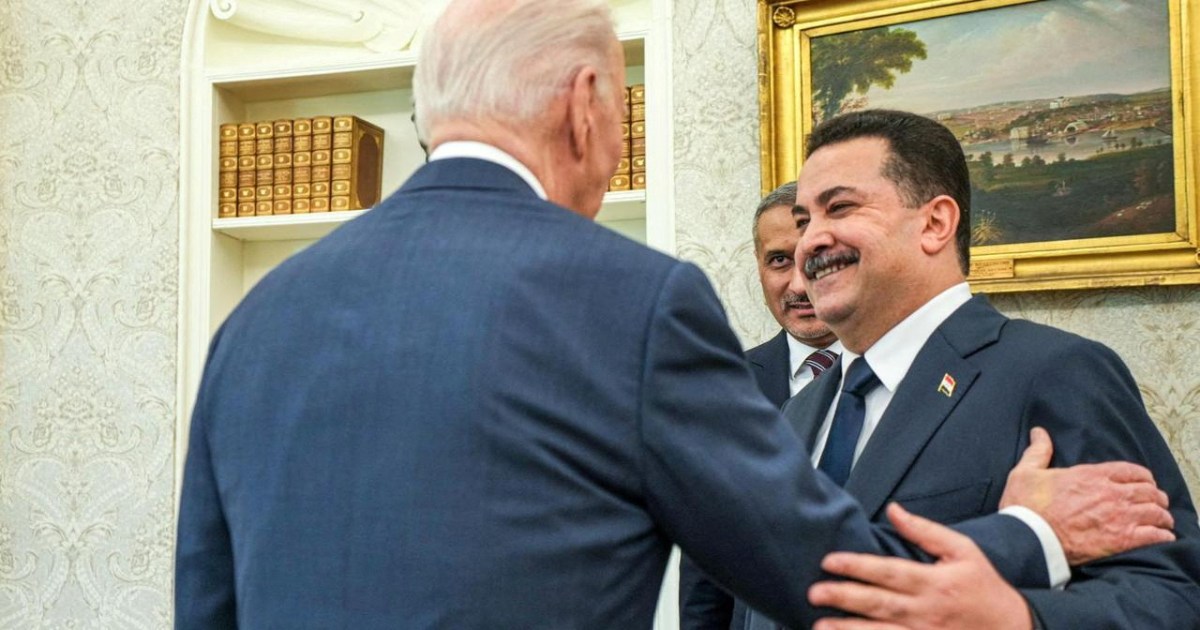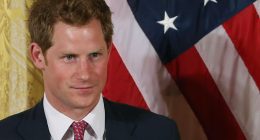
Four days ago, Iraq’s airspace had hundreds of projectiles fired from Iran flying through it towards Israel, caught in the crossfire of what many fear could be the opening salvoes of a regional war dragging in the United States.
On Monday, Iraq’s Prime Minister Mohammed Shia al-Sudani was in Washington, DC, meeting President Joe Biden and other top US officials – a preplanned trip that took on new importance for all involved.
From the White House, al-Sudani addressed the uptick in tensions, saying he encouraged “all efforts to stop the expansion of the area of the conflict”, highlighting his fears of being dragged into a regional war involving countries that continue to have a strong influence in Iraq.
Iraqi officials say their country was among a handful that Iran told of the attack – which followed an Israeli strike on the Iranian Embassy in Damascus that killed a senior Iranian general – in advance.
Regional tensions aside, al-Sudani’s primary focus appears to be Iraq’s domestic concerns as he hopes to attract investment in Iraq’s private sector and progress on a US troop withdrawal from the country, analysts told Al Jazeera.
“[Al-]Sudani’s agenda is domestically oriented. He is seeking less American restrictions on the Iraqi banking system, more investments and enhancing security ties,” Tamer Badawi, an Iraq analyst focusing on politics and security, said.
According to Sajad Jiyad, a fellow at Century International and director of the Shia Politics Working Group, the meetings went well but the timing – so soon after Iran’s attack – limited the outcome.
“I think the Iraqi side had higher expectations of what support and agreements they could reach but those were tempered by the events preceding the meeting,” Jiyad told Al Jazeera.
“For the US, the Iran-Israel clash served to highlight the need to keep US troops in Iraq for now and that the Iraqi government needs to do more to prevent Iran and groups allied with it from using Iraq as a base of operations against the US and Israel.”
Tightrope walk over US presence
More than 20 years after the US invasion of Iraq in 2003 to remove former leader Saddam Hussein, 2,500 US troops are still based in the country, primarily in counter-ISIL (ISIS) roles.
For many Iraqis, who remember the deadly post-war period well, the US presence is not welcome. Al-Sudani has had to walk a tightrope between the US and placating parts of his domestic base.
And for Iran-aligned groups, such as the militias that form the Islamic Resistance in Iraq (IRI), the US troops became a target starting October 18, in the wake of Israel’s war on Gaza.
However, after the US assassinated three senior figures in Kataib Hezbollah, the most powerful force in the IRI, in early February, the group announced it would suspend attacks on US troops.
As tensions rise in the region, Washington may view al-Sudani as a potential interlocutor with Iran.
US officials have repeatedly said they do not want to be dragged into a wider regional war and Iraq – while relatively quiet since February – has reason to fear Iran-aligned groups in the country remobilising if regional tensions expand.
“Iraq’s position is that it wants an end to hostilities in Gaza,” Yesar Al-Maleki, a Gulf analyst at the Middle East Economic Survey (MEES), told Al Jazeera.
“If Washington can manage to bring the war there to an end, it will no doubt aid Mr Sudani’s efforts to spare Iraq the repercussions, whether security or economic, from a continued conflict.”
Iraq is set to have elections in 2025 and the prime minister needs the support of his domestic backers as well as the US if he wants to renew his mandate.
“If the PM returns from Washington with US support for his government, promises of a US troop reduction or a scheduled withdrawal sometime in the future, and relieving of US restrictions on Iraq’s financial sector, these factors would support his position and even add to his public image,” Al-Maleki said.
“His visit to the White House is the first step towards building more trust to have American support for his appointment as prime minister after the next elections,” Badawi added.
Finding that balance has not always been easy, with al-Sudani pushed to call for a complete withdrawal of US troops in January, seemingly in response to some 53 US attacks on Iran-aligned groups in Iraq.
“It is important for [al-]Sudani to sustain good relations with the US,” Harith Hasan, a nonresident senior fellow at the Carnegie Middle East Center, told Al Jazeera. “He doesn’t want to come off as anti-American or to portray the end of the occupation in bad faith.”
Analysts said al-Sudani will want to show that his meetings in Washington, DC, brought progress on this issue and is under pressure to secure a troop withdrawal while maintaining US support in other areas.
But if he can reframe the US presence to show the two working as partners in a “new phase of engagement that is no longer restricted to security collaborations, it would be considered a win for [al-]Sudani”, Nancy Ezzeddine, a research fellow at the Hague-based Clingendael Institute, told Al Jazeera.
Financial stressors
In addition to discussion on US troops, al-Sudani hopes to secure financial agreements in his DC meetings to ease the pressure on Iraq.
Iraq’s economy is over-reliant on oil, which pulls in more than $100bn a year, with a bloated public sector where doing business is difficult and credit is hard to access, according to the International Labour Organization.
The revenue from Iraq’s oil is held in an Iraqi government account at the Federal Reserve Bank of New York but the US has restricted transfers to the Iraqi Ministry of Finance in recent months due to concerns over money laundering and the flow of US dollars to Iran.
“There’s been a number of anti-money laundering policies that have come into play over the past few months by both the Americans and Iraqi government by curbing usage of US dollar transactions in a number of commercial banks and closing down the money traders,” Ezzeddine said.
“This has really shrunk the foreign currency supply in the country.”
Iraq has taken steps to appease the US, including “suspending the licences of some banks, pushing for documentation and auditing of dollar transactions, reducing cash transactions and limiting the amount of dollars that banks make available for withdrawals,” Jiyad wrote in a Q&A with the Century Foundation, published on April 5.
US interests
As for the US, Biden will have both domestic and regional concerns for Iraq.
On the former, the US will be looking to nudge al-Sudani to cooperate with US allies in Erbil, the capital of the Kurdish region of northern Iraq.
Over the past six months, members of the Kurdish region’s government have made multiple trips to Washington in efforts to have the Biden administration act as mediators with Baghdad, with which it has had several disputes in recent years.
“The delegation accompanying Sudani includes officials from the [Kurdish] Regional Government, which is a positive indicator of his relationship with the KRG,” Sarhang Hamasaeed, the director of Middle East Programs at the US Institute of Peace, told Al Jazeera.
“The Kurdish leaders generally view Sudani favourably and as genuine in trying to resolve Baghdad-Erbil issues.”
“Washington wants to see Sudani enforcing Baghdad’s financial commitments towards the Kurdistan Region consistently and sustainably and allow Erbil to export oil,” Badawi said. “The Iraqi federal court’s rulings have been increasingly perceived as ‘politicised’ by Erbil and its foreign allies.”
One of these cases concerns a pipeline sending oil to Turkey from KRG-controlled territory in northern Iraq, which was shut down after the Iraqi federal government objected to the direct transfer of oil without its involvement, leading to the shutting down of the pipeline last year.
“The opening of the pipeline has been delayed with no justification for over a year now,” Ezzeddine said. “This relates not only to oil exports but also a number of other budgetary, legal and constitutional issues.”
Regionally, the Biden administration is looking to counter Iranian influence in Iraq.
“The US would want commitments to guarantee Iraq’s sovereignty by minimising Iranian influence across all levels of decision, including the politics, the economics and the security decision-making in Iran,” Ezzeddine said.
“The US president hopes to find in Sudani a partner who could contain pro-Iran factions, especially armed militias, in Iraq as the US gears into its presidential elections and Washington is more pressed than ever to de-escalate tensions in the Middle East,” Al-Maleki said.
“Success would require compromises by both leaders.”
Read More: World News | Entertainment News | Celeb News
Aljazera










